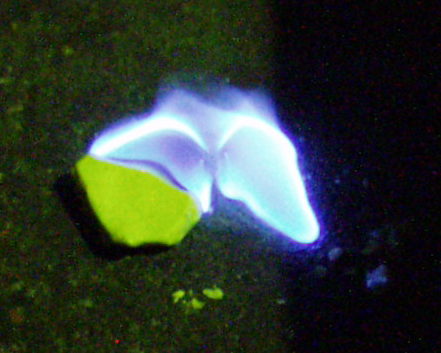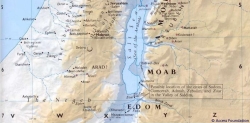wâ-Yei•râ′ 3rd Eve

Sᵊdom
 |
The two ma•lâkh•imꞋ,3 who had left earlier, arrived in Sᵊdom in the evening to begin their intelligence assessment clarifying suspicions regarding Sᵊdom's loyalty to their Iranian rule and paying their taxes (clearly the reason for their trip) and assessing Sᵊdom's military capabilities in the event a crackdown was in order.
As the two ma•lâkh•imꞋ approached Sᵊdom, they first encountered Lōt, presiding over the municipal Beit Din, built into the city gates of every city in the ancient Middle East. When Lōt saw the two ma•lâkh•imꞋ, he stood up and greeted them with a welcoming bow, saying, "Please, a•don•âiꞋ, come lodge in the home of your workman. Lodge with us and rinse the dust off your feet. You can get up early and be on your way."
"No," they demurred, preferring to remain in the public caravansary where they could better observe local commerce and municipal business. But Lōt, aware of the rebellious sentiments of the citizens of Sᵊdom against these foreign rulers, and clearly determined to promote cordial relations with them, cajoled them to consent to the safety of his home.
Finally, they relented and agreed to lodge with him and his family.4 Then Lōt made a banquet for them, including hot, freshly baked matz•otꞋ, and they ate.
It was a moonless, overcast, very dark night.5 They were about to lay down for the night when the a•nâsh•eiꞋ of Sᵊdom, from teen-agers to the municipal elders and from every burb, mobbed the house. They called to Lōt, demanding of him, "Where are the a•nâsh•imꞋ who came to you tonight? Send them out to us so we can know them."6
So Lōt went out to the entrance of his home to them, shutting his door behind him, to address the mob: "Please don't do wrong, my brothers. Look, I have two daughters who have never known a man. Let me send them out to you and you may do to them what seems good in your eyes; only to the a•nâsh•imꞋ hâ-Eil′ don't do this thing because they have come under the shadow of my roof.7
 |
| Sulfur – |
Those in the mob were shouting: "Press on!" and "This loner came to live and judge us. So now we'll do worse to you than we do to them." They pressed hard against Lōt, approaching to break down the door.
The a•nâsh•imꞋ reached out of the door, yanked Lōt back into the house and shut the door.
Both of the ma•lâkh•imꞋ, being rulers and military commanders in their own lands, came prepared for trouble during their undercover intelligence foray and were highly skilled in military tactics. They wasted no time, dazzling8 the mob of a•nâsh•imꞋ who were assaulting the entrance to the house, from the teenagers to the elders, to the point they were all stumbling around in the darkness unable to find the entrance.
Iranian Ma•lâkh•imꞋ Arrange For Lōt to Evacuate His Family Before Crackdown
 |
The attack, by the citizens of Sᵊdom, on the Iranian ma•lâkh•imꞋ sealed their fate. Since there were less than 10 tza•diq•imꞋ in the city, the three kings from the east determined to destroy Sᵊdom. But because Lōt had proven to be a man of honor – a tza•diqꞋ – affording them some protection, they arranged for him to evacuate his family before the assault.
"Evacuate everyone in your family and take everything you own with you!" warned the two ma•lâkh•imꞋ. "For tomorrow we shall ruin this place because their outcry is great – in-the-face of ä'. So ä' has sent us to ruin it."
So Lōt went to warn his son-in-law, but his son-in-law dismissed him, thinking he was a fool.
In the darkness of the night, the ma•lâkh•imꞋ warned Lōt for the last time. They had already signaled forces outside the city to attack at dawn. Still, Lōt procrastinated. So, in the mercy of ä', the ma•lâkh•imꞋ forcibly escorted Lōt, his wife and his two daughters out of the city to the south. Leaving them outside the city, one of the ma•lâkh•imꞋ warned them, "Run for your life! Don't stop anywhere in this area because it won't be safe. Flee toward the mountain10 or you'll be finished."
But Lōt objected. "If I have assimilated any of the wrong-doing of Sᵊdom, so that it clings to me, then for me to remain so close, in the mountain,10 might be too close to the coming destruction and be fatal for me. Please, let me remain in the southernmost city. It's far from here and it's a mi•tzᵊârꞋ city. Please let my nëphꞋësh live there."
"Ok," replied the ma•lâkh•imꞋ, "I've put up with you as you asked and I will make an exception for the city you've requested. Now hurry, I can't begin the attack until you get going." So he named that city TzōꞋar.

Optional parental preparation:
- Note 3 – These are the same two junior a•nâsh•imꞋ that earlier departed for Sᵊdom. But now they are acting as ma•lâkh•imꞋ. Still, these were not the imagination of one or two men dubiously claiming to have seen them but, rather, the whole city saw and recognized them as ordinary mortal, human, foreign ma•lâkh•imꞋ.

- Note 4 – As a municipal judge of Sᵊdom, Lōt was certainly aware of how his townspeople, whom he judged everyday, would react to these foreign-ruler spies.

- Note 5 – Extreme darkness of that particular night is implied by the ability of the a•nâsh•imꞋ áÌÇñÌÇðÀåÅøÄéí everyone in the mob who were crowding the entrance to Lōt's home; for example, each operating a bright sulfur –
Godfire-stone – torch, perhaps with bronze mirrors mounted behind to aim the dazzlingGodfire into their eyes, temporarily dazzling them withGodfire.
- Note 6 – The term "know" here conveys the sexual connotation of male rape, sodomy. As in modern jails, this is a form of humiliation and domination. The elders of Sᵊdom seem to be aware, or at least highly suspicious, of the two foreign ma•lâkh•imꞋ, which they could probably tell from their features, accents and perhaps dress and caravansary, that they were from the area of Iran, which exercised an unwelcome rule over them. In the Middle East culture in which honor was the defining trait of a man's reputation, male raping the two rulers like dominating new jail inmates would have inflicted a humiliation that would have prevented them even from returning home, much less remaining part of the nobility. That would have been a fate worse than death, resulting in their banishment and likely starvation and death.

- Note 7 – To Middle-Easterners, honor is an overriding motivator that has, in the last several decades, become unfathomable to westerners, including Europeans. In the ancient Middle East, and continuing in the Middle East today, honor requires that one defend any and all guests in his house with his treasure, his life and even the lives of his family. Lōt was sacrificing what honor required of him as an honorable man.

- Note 8 – These are the first recorded flash grenades; actually, likely using slings to throw burning sulfur chips, some high in the air and some directly at the crowds. Likely 1 part temporary dazzle-blindness to 9 parts superstitious dazzle-fear of
Godfire among the ancient city residents. Sᵊdom is located in an area brimming with various chemicals, like sulfur – brimstone; Hellenized toGodfire-stone. (See photo.)
- Note 10 – Contrary to agenda-driven, rabbinic simplism, identification of "the mountain" is straightforward. Looking, from Sᵊdom, east across the plain, it was "the mountain" on the horizon (in today's west Jordan). Moreover, this is where Lōt finally had to move from TzōꞋar – exactly as the ma•lâkhꞋ had directed.

Questions you might anticipate that your child might raise and be prepared to discuss:
- What is a caravan? What was a caravansary and what was it like? (A downtown dirt parking lot next to the central municipal outdoor farmer's market; posts to tie camels, donkeys and horses; a water source for people and animals, and campsites with places for campfires. Matches hadn't been invented, so fires were difficult to make.)
- What is assimilation?
Google+ registered author & publisher

